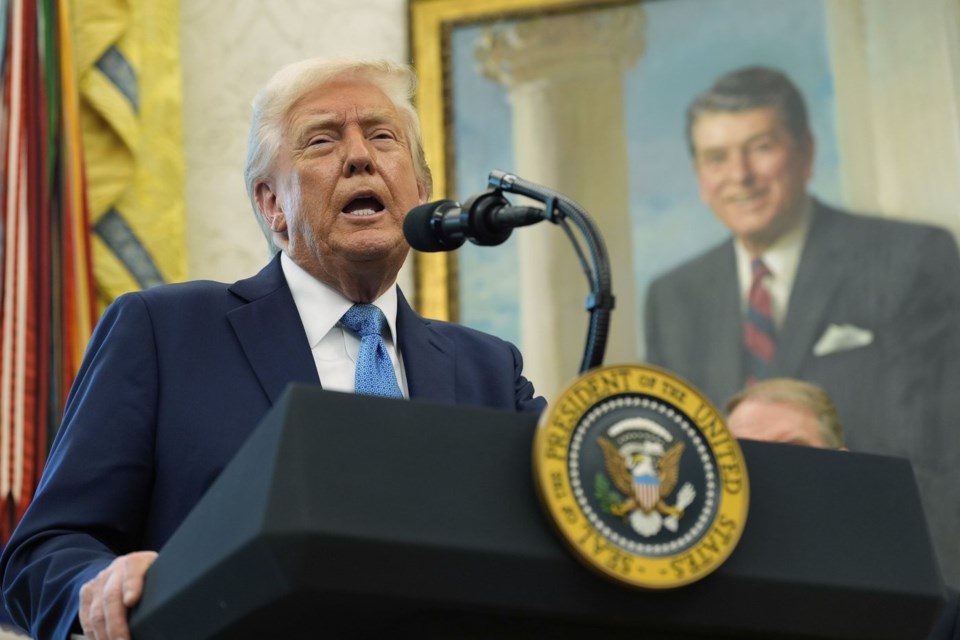WASHINGTON (AP) — A federal judge expressed deep skepticism Wednesday over a President Donald Trump executive order targeting a prominent law firm, signaling that she was inclined to grant a request to permanently block its enforcement.
U.S. District Judge Beryl Howell grilled a Justice Department lawyer over the government's plans to suspend security clearances from lawyers at the firm of Perkins Coie and pressed him to explain why the Trump administration was forcing law firms to disavow the use of diversity, equity and inclusion considerations in its hiring practices.
“Why does the administration view those three words as dirty?” Howell asked.
Justice Department attorney Richard Lawson said the government remains concerned about what it considers the “unlawful” evaluation by law firms of applicants based on of “race, sex and ethnic based issues unrelated to them as individuals.”
At issue Wednesday were requests from two law firms — Perkins Coie and WilmerHale — to permanently halt executive orders imposed against them last month. Judges last month temporarily blocked enforcement of key provisions of both orders, but the firms are asking for the edicts to be struck down in their entirety and for judges to issue rulings in their favor. Another firm, Jenner & Block, is expected to make similar arguments next week.
The executive orders taking aim at some of the country’s most elite and prominent law firms are part of a wide-ranging retribution campaign by Trump designed to reshape civil society and extract concessions from perceived adversaries. The actions have forced targeted entities, whether law firms or universities, to decide whether to push back and risk further incurring the administration’s ire or to agree to concessions in hopes of averting sanctions. Some firms have challenged the orders in court, but others have proactively reached settlements.
The firms consider the orders to be unconstitutional assaults on the legal profession that threaten their relationships with clients and retaliate against them based either on their past legal representations or their association with particular attorneys who Trump perceives as his adversaries.
The executive actions have generally imposed the same sanctions against the targeted firms, including ordering the suspension of security clearances, the termination of federal contracts and restrictions in access to federal buildings for firm employees.
In court Wednesday, Howell said she was troubled that the administration was putting the “cart before the horse” by stripping security clearances en masse without first conducting an individualized review of attorneys. She appeared to grow exasperated as Lawson struggled to answer questions about the basic mechanics for implementing the security clearance suspension or the review process for the targeted attorneys.
"You can’t tell me which agencies are conducting this review?” she asked at one point.
“You don’t know whether the firm or the attorney whose security clearance has been suspended has been given notice about the timing of the review” or whether they will have an ability to object to the review, she said.
The first law firm action took place in February when Trump suspended the security clearances of attorneys at Covington & Burling who have provided legal services to special counsel Jack Smith, who investigated the president between his first and second terms and secured two indictments that have since been abandoned.
The executive order targeting Perkins Coie singled out the firm's representation of Democratic presidential nominee Hillary Clinton during the 2016 presidential race, and the one against WilmerHale cited the fact that special counsel Robert Mueller — who investigated Trump during his first term over potential ties between Russia and his 2016 campaign — was for years a partner at the firm.
Last month, Paul Weiss cut a deal with the Trump administration that resulted in an executive order against the firm being rescinded.
Since then, more than a half-dozen other firms have reached agreements with the White House that require them, among other things, to dedicate free legal services to causes the Trump administration says it champions.
They include Skadden, Arps, Slate, Meagher & Flom; Milbank; Willkie, Farr & Gallagher; Kirkland & Ellis; Latham & Watkins LLP; Allen Overy Shearman Sterling US LLP; Simpson Thacher & Bartlett LLP; and Cadwalader, Taft & Wickersham.
Eric Tucker, The Associated Press



